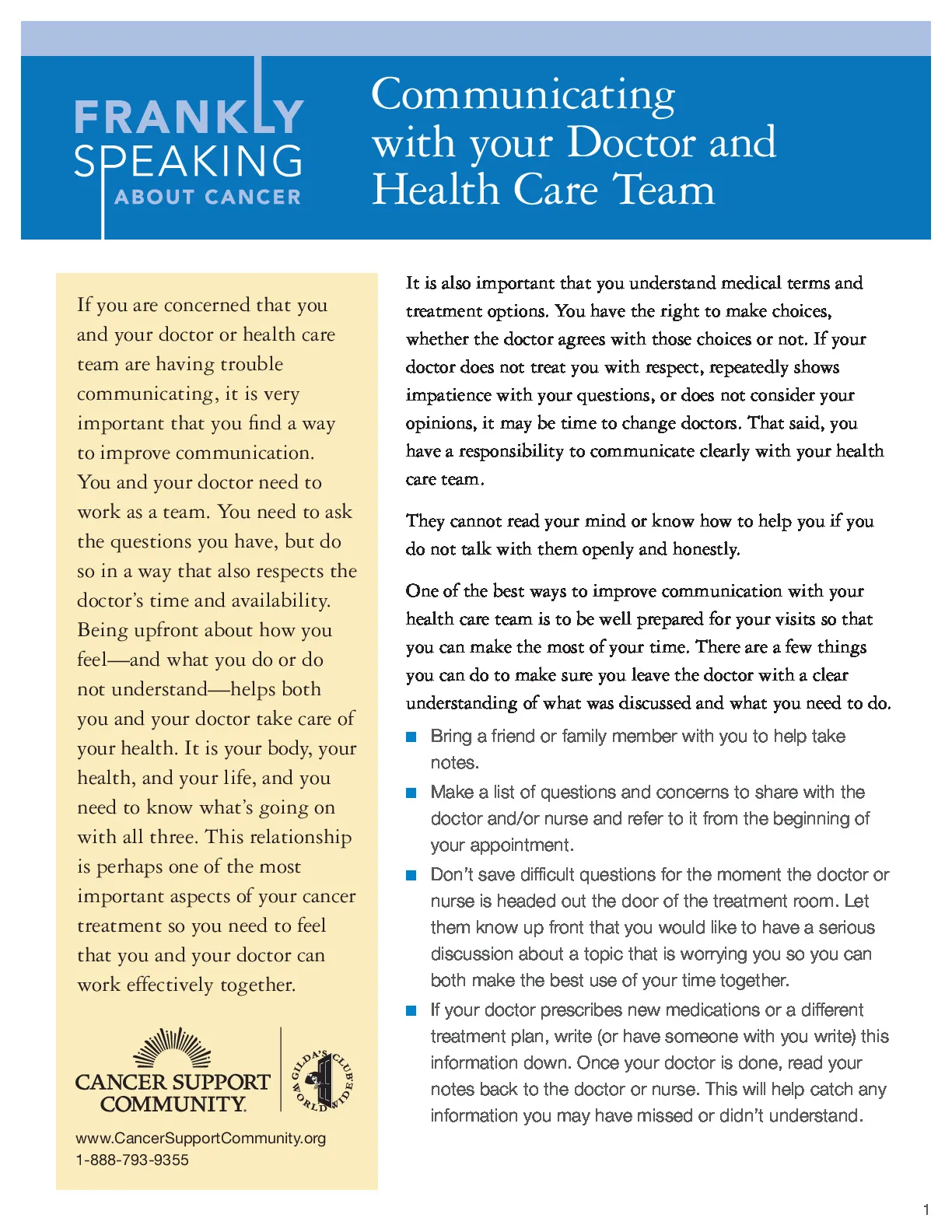Cancer Treatment
Let Us Personalize Your Visit. I am:
If you've already saved your personalized content, login.
Table of Contents
Where Do I Begin?
The first critical step to managing your cancer treatment is making the decision to empower yourself. At Cancer Support Community, “empower yourself” is a phrase we use to describe the ongoing process of making a personal effort to become educated about your cancer diagnosis, your cancer treatment, your health care team, and ways to improve your overall wellbeing. To become “empowered” means that you choose to adopt a series of actions, behaviors, and attitudes that can improve the quality of your life. It’s not about making monumental changes but rather small incremental steps such as asking questions or self-educating to gain a sense of confidence and control as you move forward with your cancer treatment.
Cancer is treated in a multidisciplinary way, meaning several different types of health care professionals will be managing your care. The selection of your oncologist and health care team is one of the most important decisions you need to make and manage throughout your treatment for cancer. An effective treatment for cancer requires a considerable effort by both you (the patient), and your physician. Forming a strong relationship with your cancer care team will be crucial to managing your cancer journey.
Your active participation in the choices you make with your health care team can make a big difference in your cancer experience and quality of life. One way you can do this is to prepare a list of questions for each appointment. Also, be sure to ask for clarification of any terms you do not understand. If you do not feel like you will be able to develop a good relationship with your doctor, consider finding another one. And remember: It is always ok to get a second opinion on your diagnosis and treatment plan from another doctor.
Get a Second Opinion
Carmen, a lung cancer survivor, shares the importance in asking questions and getting a second opinion.
Develop a Treatment Plan
To ensure you understand all aspects of your care, you may want to ask your doctor or your oncology nurse to develop a written cancer treatment plan. This can be a useful communication tool for you and your doctor as it helps you have a full big picture view of what’s to come. It will also help keep you organized, ask questions, and prepare for what’s next.
Your treatment plan reflects your unique situation, taking into account not only the type of cancer you have but your overall medical condition and your personal considerations.
Your cancer treatment plan should include:
- Your cancer diagnosis, tumor characteristics, tests you have had to diagnose your cancer, tests will need to have performed (and how often), treatments you have had or will receive, and how to access support services.
- Dates and location of scheduled treatments.
- Side effects of treatments.
- Recommendations and precautions for managing side effects.
- Information on scheduling follow-up visits, tests, etc.
- Complete contact information for all of the members of your health care team.
Make sure you understand what is in your treatment plans. There can be a lot of information to digest. If you don’t understand something, ask. Relaying the information back to the doctor can also be helpful to know that everyone is on the same page. The American Society of Clinical Oncology has developed sample treatment plans and templates that can help you and your doctor develop your written treatment plan.
Managing Your Health
Managing Medications
Cancer treatment usually involves chemotherapy or targeted therapy to treat the cancer as well as other medications for managing side effects.
It is important to keep track of the medication you are taking. These tips can help:
- Get organized. Use pill organizers, charts, calendars, or another method that works for you to keep track of your medication. This will help you ensure you are taking the right medication at the right time.
- Maintain a master list of your medications. One easy way to do this is to ask your health care team to print out a list of your medications for you. Your medications are likely to change over the course of your cancer treatment, so be sure to review this list at each appointment. If you have a spouse or caregiver who helps you organize your medications, it will be important to review the list with them as well.
- Do not skip a dose. If you do, contact your health care team for directions.
- Make every attempt to not run out of your medicine. Call your pharmacy when you notice that you are running low and need a refill. If you use mail order delivery, remember to give staff ample time to refill your medication and speak with your insurance company.
- Tell your doctors and nurses about any side effects that you experience, even if you don’t think they are that important. They will have information and advise on how to help manage them.
- Talk to your care team before taking any medication, vaccination, herb or supplement suggested by a health care provider who is not part of your cancer care team. It’s possible that something another provider suggests you take may interact with your cancer treatments and make them less effective or cause more side effects.

Make a Treatment Decision that is Right for You
For decision support counseling, consider CSC's Open to Options® program.
Maintaining a Healthy Lifestyle
Undergoing cancer treatment is challenging but taking steps to ensure you are maintaining a healthy lifestyle can make a world of difference in how you get through your cancer journey. Developing or continuing healthy habits will not only help you lessen the rigors of cancer treatment, but benefit you even after treatment is finished.
Try to choose to adopt a series of actions, behaviors, and attitudes that aim for a healthy lifestyle. Each individual is unique; each person’s cancer is different. You are the expert in your cancer experience in relation to how you feel, what is important to you, and what you want. Work with your health team to tailor steps to healthy living that will work for you.
Healthy Living During Cancer Treatment
During treatment, it’s important to try to maintain as a healthy a lifestyle as you can. What does this mean?
- Don’t smoke. If you smoke, talk to your doctor about quitting.
- Get proper nutrition. This is essential as your body undergoes the rigors of treatment and exerts a lot of energy into healing and recovery. Taking steps to have a healthy diet will help you to have fuel and power to keep up your strength.
- Exercise. Doctors encourage cancer patients to stay as active as possible. Be sure to talk to your doctor to learn how to best tailor your exercise regimen for you.
- Pay attention to your emotional health. Getting a cancer diagnosis can be hard to handle. You may experience a rollercoaster of emotions throughout your treatment including fear, worry, sadness, anxiety, anger, and many more. However, there are many ways that can help you cope healthily with your emotions and cancer experience.
Emotional Support
Frankly Speaking About Cancer Library
LibraryWould you like a print copy of these educational materials?
We can mail our Frankly Speaking About Cancer pieces to you. Shipping is free for up to 20 pounds.


